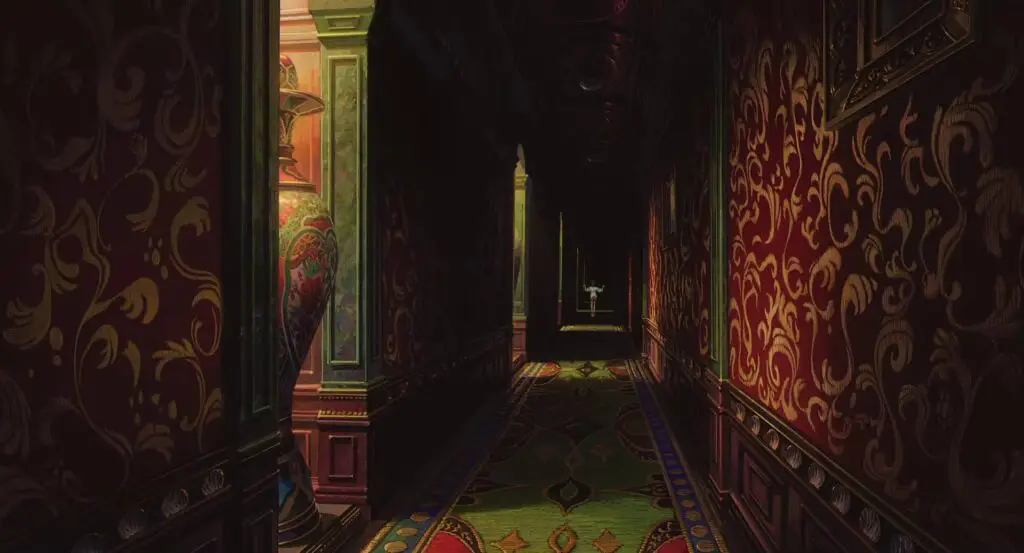
Отнесена от духовете
„Отнесена от духовете“ (2001) е един от най-признатите филми на Studio Ghibli, режисиран от легендарния Хаяо Миядзаки. Този анимационен шедьовър се възхвалява за сложното си разказване, богатата анимация и дълбоко вградените теми и символи.
Основни теми и символика
Преходът към зрелостта и самооткриването
В сърцето си „Отнесена от духовете“ е история за преход към зрелостта. Филмът следва протагонистката Чихиро, докато се превръща от мърморещо, зависимо дете в зряло, самостоятелно лице. Чрез изпитанията си в духовния свят тя научава ценностите на упоритата работа, добротата и устойчивостта.
Консуматорство и алчност
Банята – централно място във филма – служи като микрокосмос на ненаситния апетит на обществото за консумация. Трансформацията на Без-лице особено олицетворява опасностите от неконтролируемото потребление и алчност.
Екологичност и опазване на природата
Много от филмите на Миядзаки засягат екологични теми, и „Отнесена от духовете“ не прави изключение. Замърсеният речен дух, на когото Чихиро помага да се пречисти, е символ на екологичната деградация, причинена от човека. Това подчертава важността на уважението и възстановяването на природата.
Идентичност и силата на имената
Именуването е мощна тема във филма. При влизането в духовния свят името на Чихиро е взето и тя получава името „Сен“. Като взема нейното име, Юбаба получава контрол над Чихиро. Възвръщането на името представлява пътешествието на Чихиро да си върне идентичността и свободата.
Японска традиция срещу западно влияние
Банята и нейните духове могат да се разглеждат като представяне на традиционната японска култура, докато Чихиро и семейството ѝ в началото представляват навлизането на западни ценности и модернизация.
Ценни уроци за деца и възрастни
Филмът предлага множество важни поуки:
Важността на смелостта – Чихиро преодолява страховете си, за да спаси родителите и приятелите си, учейки децата да се изправят срещу собствените си страхове.
Стойността на упоритата работа – Работата на Чихиро в банята показва, че упоритата работа е възнаграждаваща и изгражда характер.
Последиците от алчността – Поведението на Без-лице в банята е предупредителна история срещу това да позволим на алчността да ни контролира.
Разбирането на идентичността – Загубата и възвръщането на името на Чихиро символизират търсенето на лична идентичност.
Уважението към природата – Трансформацията на замърсения речен дух ни напомня да се грижим за природата и да я уважаваме.
Защо „Отнесена от духовете“ е вечна класика?
„Отнесена от духовете“ е многопластова, многостранна приказка, която преплита личностния растеж с по-широки обществени коментари. Смесицата от зашеметяващи визуални образи, трогателни теми и сърдечен разказ го правят вечена класика в света на анимацията.
Филмът учи зрителите да гледат отвъд повърхността – много от героите не са това, което изглеждат. Без-лице изглежда нежен, но става чудовище; Юбаба изглежда зла, но има моменти на доброта; а Хаку, първоначално заплашителен, става защитник на Чихиро.
Заключение
Този анимационен шедьовър продължава да вдъхновява публики по целия свят със своите универсални теми за растеж, самооткриване и важността на запазването на нашата връзка с природата и традициите. „Отнесена от духовете“ не е просто филм – това е пътешествие, което ни учи на смелост, състрадание и важността да останем верни на себе си.
